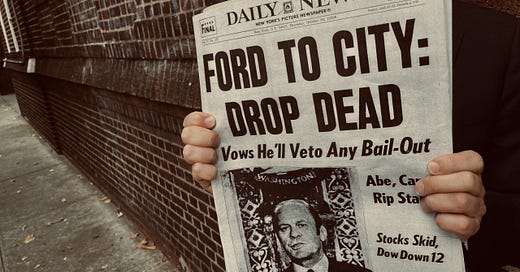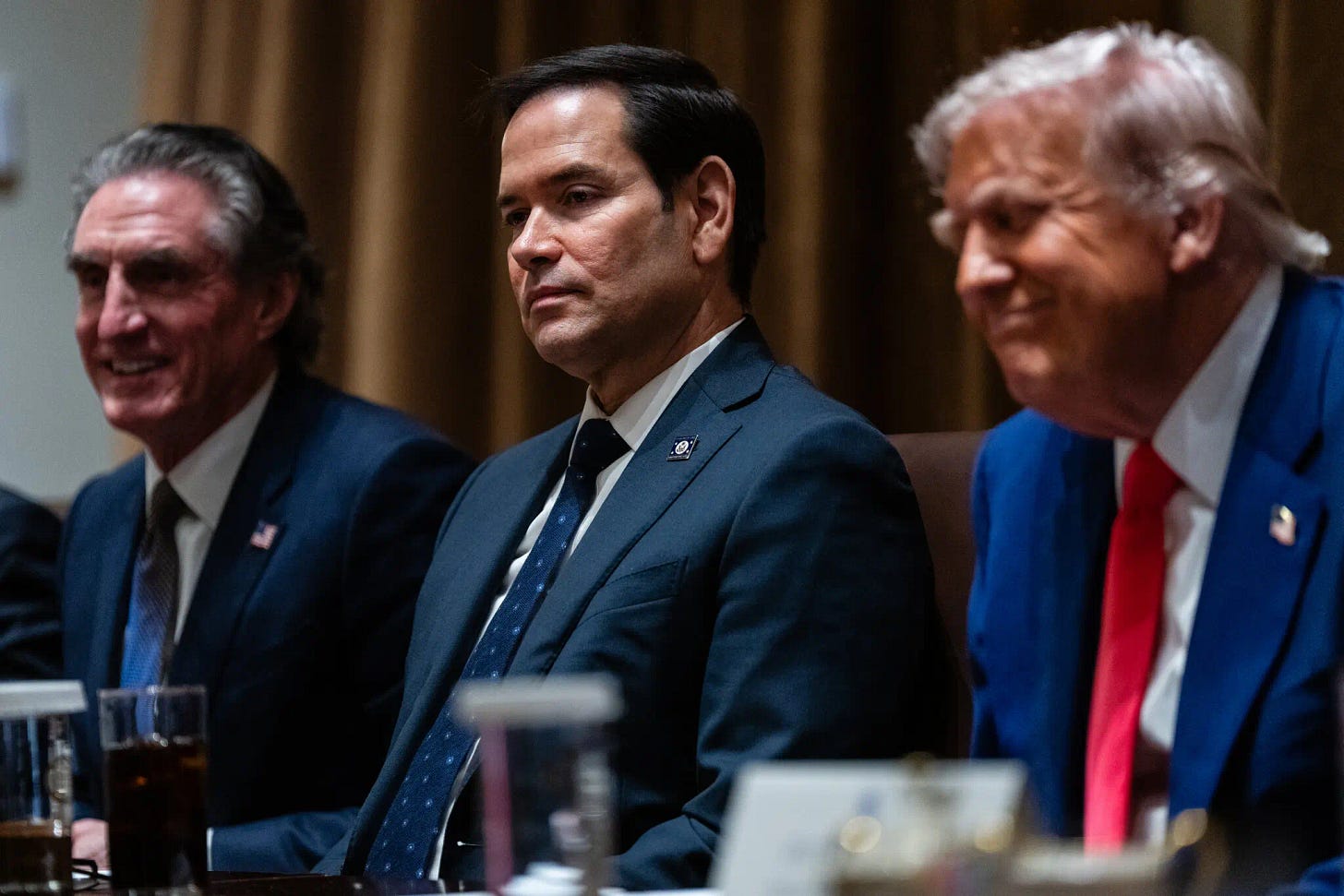This is a reader-supported publication. I give it all away for free but could really use your support if you want me to keep doing this.
Buried in most of the stories about SECSTATE Rubio’s plans to recast and reduce the State Department bureaucracy is the quieter and sadder tale of Trump 2.0 essentially downgrading our diplomatic interest in Africa to the point of obliviousness.
The most striking proposed elimination of the in-the-works transformation:
The current Africa Bureau would be eliminated. In its place would be a "Special Envoy Office for African Affairs" who reports to the White House's internal National Security Council, rather than the State Department.
Africa doesn’t even warrant its own bureau anymore? The world’s second-largest and second-most-populated continent after Asia?
The Youth Bulge of All Youth Bulges
Really solid NYT article exploring a subject very familiar to me: the inevitable demographic rise/transition of Africa this mid-century.
I will be really shocked if the Administration goes through with that.
Africa will account for 40% of world population growth this century. By 2050, Africans will constitute one out of every four humans on our planet, with most of them being younger than 18 years old.
You know my take on that reality: Africa constitutes the great cheap labor pool of the mid-century mark. Everybody”upstream” of that reality seems interested in cashing in on it — everybody except us.
I do not advocate concentrating US diplomatic and security attention on the continent, and I don’t believe the US is really in any position to seriously out-perform the combination of India, China, Russia, EU, and the PG monarchies in fueling the continent’s economic rise in coming years and decades. But this is far too dismissive — basically relegating Africa to the status of a shithole continent unworthy of any strategic attention.
Here’s PerplexityAI’s summary case for considering Africa strategically important:
From US Africa Command (a command supposedly slated for elimination and folding back into European Command), check out this counter-argument:
A new U.S. approach to Africa starts with a new mindset. While there is tremendous human need on the continent, seven of the 10 fastest growing economies in the world are in Africa. Thirty-four countries, home to 72 percent of Africa’s citizens, improved their governance performance over the past decade. Banking, production of raw material, and basic manufacturing, which account for 40% of Africa’s GDP, are slowly but surely transitioning to African-owned and African-run enterprises. None of these trends mean change will come fast or steadily. Therefore, a new U.S. mindset for Africa must focus—politically, economically, and militarily—on fostering long-term change.
Rejecting a positive view of Africa’s trajectory does not lessen the continent’s importance. In the next 35 years, Africa’s population is expected to double—comprising nearly 30% of the world’s population by 2050. By 2025, an additional 90 million African households will enter the consumer class—contributing a purchasing power of $2.1 trillion to the global economy. International routes into the Mediterranean, Red Sea, and Indian Oceans pass through African waters—affecting four of the U.S. military’s Geographic Combatant Commands. And, as the cost of labor in China increases, Africa—with the world’s largest labor pool—will likely become the world’s next epicenter of manufacturing.
The truth is, Africa will play a central role in the next century whether the U.S. likes it or not.
Again, I would hardly prioritize Africa precisely due to the structural realities captured above, as it’s just a bridge too far in developmental terms (i.e., we are too advanced an economy to play big-time integrator and builder across a far-less developed Africa), but still … you don’t need to just throw it away.
Another alleged quote from the draft plans still to be fully announced:
"All non-essential embassies and consulates in Sub-Saharan Africa shall be closed," the draft order says, with all remaining missions consolidated under a special envoy "using targeted, mission-driven deployments."
To me, that sounds like, when we find we need to kill some bad guys in Africa, we’ll do what we gotta do but that’s it — the Powell Doctrine taken to extremes.
Targets addressed by mission deployments … pretty clear signals.
What’s really sad is seeing Rubio have to front this whole scheme.
Nasty descriptions like “bloated, bureaucratic” … fine and dandy, but describing State as “beholden to radical political ideology”? That has a certain hysteric, show-trial feeling to it, one that goes completely against the Rubio’s Senate career, which was laudable.
As a Republican senator from Florida, Mr. Rubio was an ardent champion of promoting traditional American values abroad and supported the State Department’s work to that end. But as secretary of state, he has hewed closely to Mr. Trump’s transactional approach to foreign policy, which puts values aside and leans into trading favors, including with authoritarian governments.
The price of ambition, one figures, but … depressing and probably eating him up inside.
We should expect significant reductions in US diplomatic presence across Sub-Saharan Africa, with embassies targeted in places like the Central African Republic, Republic of Congo, Eritrea, Gambia, South Sudan, and Lesotho (a country nobody has ever heard of, I am told). Various consulates (supposedly in South Africa and Cameroon) will also get whacked. Our long-time mission in failed-state Somalia will be downsized. To be sure, emigration from Africa to the US will get a lot harder for individuals to manage, in some instances requiring applicants to travel to neighboring countries.
Of course, this Administration has a track record of leaking drafts to test the waters and then backing off once the pushback balloons, so we will see.
But still …
That’s a big chunk of the world to write off so casually, or to cede to Russia and China with such indifference.
Then there’s the continuing reality that the Trans Sahel region is morphing into the last battlefield between the West and radical Salafi jihadism. Remember: the right 9/11-like strike can pull us back into such “forever wars.”
Jihadism's shifting center of gravity
This is the story I told almost two decades ago in Blueprint for Action: A Future Worth Creating (2005), with the key caveat here being that this was written before the creation of Africa Command, which I predicted in a concluding “Heroes Yet Discovered” segment by citing “The first U.S. military commander of African Command” (p. 338)
The future of globalization is largely centered in Africa this century, and America’s diplomatic, soft-power presence is the cheapest and most cost effective tool in our overall toolkit.
But it does fit the Trumpian pattern and agenda of focusing on old friends (Europe) and new friends (South Asia) and targets for acquisition (Americas). Per Australia’s Lowry Institute 2024 Global Diplomacy Index, those are the places where we still out-represent China.
The details from Lowry:
China has a larger diplomatic footprint than the United States in Africa (60:56), East Asia (44:27), the Pacific Islands countries (9:8), and Central Asia (7:6) after the United States withdrew from Afghanistan.
The United States still leads China diplomatically in Europe (78:73), North and Central America (40:24), and South Asia (12:10). Both countries have an equal number of posts in the Middle East (17) and South America (15).
So far, this Administration has excelled at angering other states or making them anxious. Eventually, it needs to start producing some actual diplomatic wins, otherwise this just seems like budget cutting amidst America’s continuing retreat from the world’s stage — again, not something I imagine Marco Rubio signed up for.













Yep, Cecil Rhodes would be so proud. Africa as one big Imperial mine, as he intended.
It is apparent that this administration is 'giving Africa to China.' And China is wholly accepting of the task, as they have been long moving their geo-politics towards trade relationships with Africa. When African nations need help building roads they call China first. I don't even think US is an afterthought. I'm not saying that the US should drop Africa... only agreeing that they have.